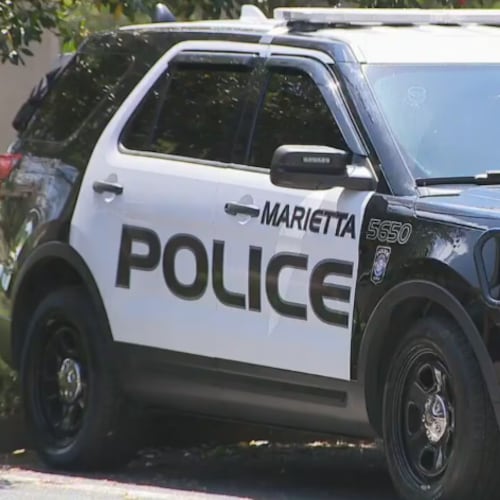A new breakdown of Census and tax data provides the closest look yet at what the proposed “Buckhead City” would look like, revealing it would be overwhelmingly white and could strip a sizeable chunk of revenue from Atlanta’s budget.
State lawmakers introduced a bill last month that would carve out the community from Atlanta and make it a separate city. Supporters of Buckhead cityhood say they want more local control over issues like crime and infrastructure, but critics say the move is divisive and wouldn’t fix crime problems in the area.
With nearly 90,000 residents, Buckhead City would take nearly 20% of Atlanta’s population and become the 10th largest city in Georgia, according to an Atlanta Journal-Constitution analysis using 2019 population and demographic estimates from the U.S. Census Bureau. But it would remove about 40% of the assessed value of the city of Atlanta’s property off the books, according to Fulton County tax records.
Inside the new city, about 74% of residents would be white and just 11% would be Black, meaning the proportion of Black residents in Buckhead City would be smaller than is found in Sandy Springs, Johns Creek, Kennesaw and Woodstock. About 8% of the population would be Asian and 5% Latino.
“The scale of this de-annexation, it would be the biggest thing to happen in the state of Georgia with regards to cityhood,” said Michael Leo Owens, an Emory University professor and an expert on urban politics. “One has to consider what the ripple effects would be.” (Story continues below interactive charts.)
The cost of leaving
The AJC’s analysis used the geographic boundaries for Buckhead City included in the recent bill that was filed in the state Legislature supporting its creation. Stretching from the divide of I-75 and I-85 to Atlanta’s northern and northwestern borders, the idea of Buckhead City might be aimed at addressing crime, but it risks creating vast financial problems for the city left behind.
The Buckhead Exploratory Committee, the group leading the cityhood movement, is in the process of fundraising for a feasibility study that will determine whether a new city would be financially sustainable. The group said it might change its boundaries following that study. (Story continues below interactive map.)
A frequent criticism of Buckhead cityhood is that it could leave Atlanta in an impossible financial situation. The city gets most of its revenue, over $232 million in the latest fiscal year, from property taxes paid by homeowners and commercial property owners.
The assessed value of all the real estate in Atlanta currently totals nearly $35 billion, according to Fulton County Tax Assessor’s data. About 41% of that — over $14 billion — is in Buckhead. With its high-end shopping offerings, Buckhead has always had a strong commercial tax base; the most valuable piece of property is popular Lenox Square mall, valued at nearly $400 million by the county.
If Buckhead’s property taxes are taken off the books, Atlanta’s budget “would be completely wrecked,” Owens said.
Credit: HYOSUB SHIN / AJC
Credit: HYOSUB SHIN / AJC
Buckhead Exploratory Committee president Sam Lenaeus said any loss of revenue for Atlanta would be partly offset by a reduction in expenses when it no longer has to provide services to Buckhead. He said Buckhead City would be willing to negotiate and possibly partner on expenses or intergovernmental agreements.
“If Buckhead City were to incorporate, Atlanta would not need to patrol those neighborhoods or provide for traffic control for the area, which would drastically reduce Atlanta’s liabilities,” Lenaeus said in a statement.
The new city would have a median household income of $140,500, giving it the second-highest median income of any city in Georgia, behind tiny Berkeley Lake in Gwinnett County, according to Census estimates. That’s more than double the current median household income in Atlanta, which is just under $60,000. If Buckhead breaks away, that number would drop to $52,700.
‘A matter of time’
Atlanta is a city known largely for its diversity and contributions to the civil rights movement. At a time when issues of race are under the microscope, the implications of a wealthy, mostly white community leaving a majority Black city are hard to overlook.
The U.S. Census estimated in 2019 that Atlanta was 50% Black, 38% white, 4% Asian and 4% Latino. Based on those figures, if Buckhead becomes its own city, Atlanta would become 59% Black and its share of white residents would drop to 31%, the data shows.
Credit: HYOSUB SHIN / AJC
Credit: HYOSUB SHIN / AJC
The racial dynamics are especially significant given Buckhead’s history. Buckhead was first annexed into Atlanta along with other areas of the city in 1952 under then-Mayor William B. Hartsfield. At the time, the move was racially motivated: Hartsfield wanted to offset Atlanta’s growing Black population and political power, historians said.
Over the decades, Buckhead has played an important and influential role in Atlanta’s economy and local politics as it grew into a hub for business. Dating back to the ’60s, Atlanta’s political elite and business class — both Black and white — have worked together to advance racial issues and make the city desirable for businesses, though that relationship has been challenged at times.
“It was just a matter of time for Buckhead. ... It doesn’t surprise me,” said Rev. Herman “Skip” Mason, a local historian, citing the modern cityhood movement in metro Atlanta’s suburbs that began with Sandy Springs leaving north Fulton County in 2005. “The dynamics and the demographics have changed tremendously.”
Atlanta is now partly surrounded by breakaway cities, from South Fulton on its southwestern edge, Sandy Springs to the north and Brookhaven just east of Buckhead.
There are pockets of Black history in Buckhead, including a former African-American neighborhood near what is now the Lenox MARTA station, Mason said. Johnsontown was settled from 1912 until the early 1980s, when MARTA acquired the land for the transit station.
Arguments for creating an independent Buckhead have leaned heavily on what some say is uncontrolled crime throughout Atlanta. Despite new city efforts to bolster public safety, Buckhead has already taken steps to fund additional security patrols in its commercial areas in the last year.
“The city of Atlanta simply can not keep the entire city safe. We believe it is in the best interest of the entirety of metro Atlanta to have a police force in Buckhead City that can adequately deal with crime and take the pressure off of the Atlanta Police Department by reducing the areas they need to patrol,” Lenaeus said.
Mayor Keisha Lance Bottoms has been a vocal opponent of Buckhead cityhood, speaking out against it during press conferences, in statements to reporters and in a speech before the Buckhead Rotary Club. She and other critics, which include several prominent Buckhead business and civic organizations, say the formation of a new city out of an existing one would be overly complex and wouldn’t stop crime from coming into Buckhead.
“Buckhead has, and always will be an important and valued part of Atlanta,” a spokesman for Bottoms said in a statement earlier this month.
The Buckhead Council of Neighborhoods, a residents’ group chaired by former mayoral candidate Mary Norwood, has not weighed in on the prospect of cityhood yet. The Buckhead Exploratory Committee is set to give a presentation at the group’s May 13 meeting.
After the exploratory committee’s feasibility study begins, it could take up to six months to complete. Proponents are aiming to pass the Buckhead cityhood bill during next year’s legislative session, which would allow Buckhead residents to vote on the idea on the November 2022 ballot.
Pro and Con: Two studies by advocacy groups
Sept. 2021: Feasbility study funded by supporters of Buckhead City
Keep Reading
The Latest
Featured




